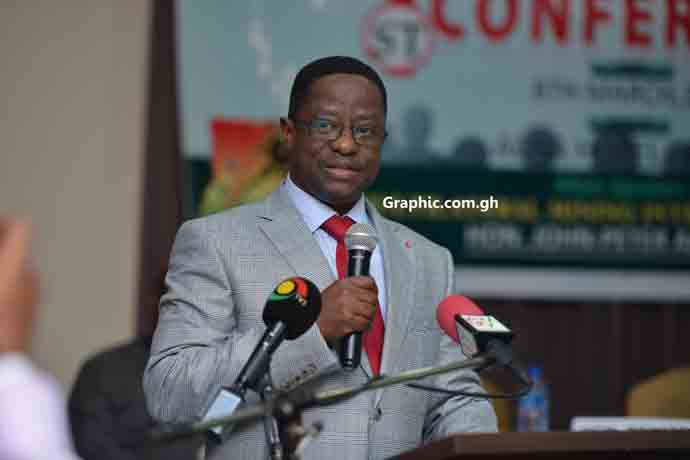
Energy Minister bemoans abuse of local content law
The Minister of Energy, Mr John Peter Amewu, has taken a swipe at local Ghanaian companies that continue to front for the International Oil Companies (IOCs) instead of taking advantage of provisions in the Petroleum (Local Content and Local Participation) Regulations, 2013, LI 2204, to play an active role in the sector.
He explained that the law made a provision for five per cent equity participation of an indigenous Ghanaian company, other than the Ghana National Petroleum Corporation (GNPC), in the petroleum agreement process. However, some locals chose to front for the IOCs.
“What we see most often is the case where instead of making good use of this provision, we become frontiers. Fronting has become so common that the basis of Ghanaians becoming the participants of the oil production has been denied and IOCs consider us as people joking.
“If we decide and refuse to participate and rather prefer to front, then as a country we will never be considered a serious entity making any gains in the upstream sector,” he said at a workshop on the participation of indigenous Ghanaian companies (IGC) in petroleum operations in Accra on September 7.
He, therefore, urged the local companies to desist from that practice and position themselves to help in growing the economy through the fledgling oil and gas sector.
The Energy Minister added that the opportunities that the sector presented were enormous and it was, therefore, important to harness them because it remained critical to the growth of the Ghanaian economy.
The workshop, which was on the theme: “Encouraging equity participation in the petroleum agreement by indigenous Ghanaian companies”, was to, among other things, provide the platform to deliberate on the ramifications of the indigenous citizen’s participation in the petroleum sector.
Capacity can be procured
Mr Amewu said the expectations that heralded the discovery of oil production had not been realised largely due to the fact that the capacity to exploit was not available as of the time of the discovery.
That, he however explained, should not be the reason why the locals would continue to lose out but instead, capacity could be procured.
“The expectations of the discovery were not actually realised. Basic reason why that realisation was not achieved was that at the point of discovery, that capacity was not available,” he stated.
He said the ministry was expecting the locals to participate in the bidding round next month, taking advantage of the five per cent local equity participation provision in the regulation.
“Nothing stops the locals from participating in the competitive licensing round. The advantage again is the five per cent equity participation which cuts across whether through negotiation or competitive bidding, and the locals can play along,” he said.
He added that: “Even though we are saying indigenisation, we expect them to come with some level of competence. There may be some discount in terms of how you compete with the others but that competent level is required.”
Financial support
Mr Amewu explained that one of the major challenge with the participation of locals in the sector had to do with capital injection because it required huge capital investment and, therefore, a robust banking sector could provide the needed financial support for the companies.
“So the challenge itself doesn’t have to do with the training of Ghanaians, that is why I say that capacity can always be procured. The banking system in Ghana is so weak and thankfully the current administration is trying to bring the banks together so we have a strong financial system in the country.
“If that is done and done very well, then the companies can come together through syndication process to support the locals in exploration. If we need our local people to go into exploration and development, then we need to support them,” he said.
Maiden licensing round
The Chairman, Licensing Round Bid Evaluation and Negotiation Committee, Mr Lawrence Apaalse, said the committee was inaugurated in May this year with a mandate to oversee Ghana’s maiden licensing rounds.
He noted that the committee would announce the commencement of the licensing round on October 5, 2018, after which interested companies, individuals or consortiums would be required to express their interest for any of the three blocs.
He said two of the blocs would be given out through direct negotiation while the remaining one would be given to the National Oil Company, the Ghana National Petroleum Corporation (GNPC). Reasons for this arrangement, he said, would be advanced during the launch of the bidding process.
“For the 2018/2019 licensing round, we will have three blocks that will be allocated through public tender,” he said.
He added that local participation was key to a Petroleum Agreement (PA) becoming effective aside from the mandatory 15 per cent carried and participation interest of the GNPC, and the committee was currently promoting the basin ahead of the launch of the first licensing round.